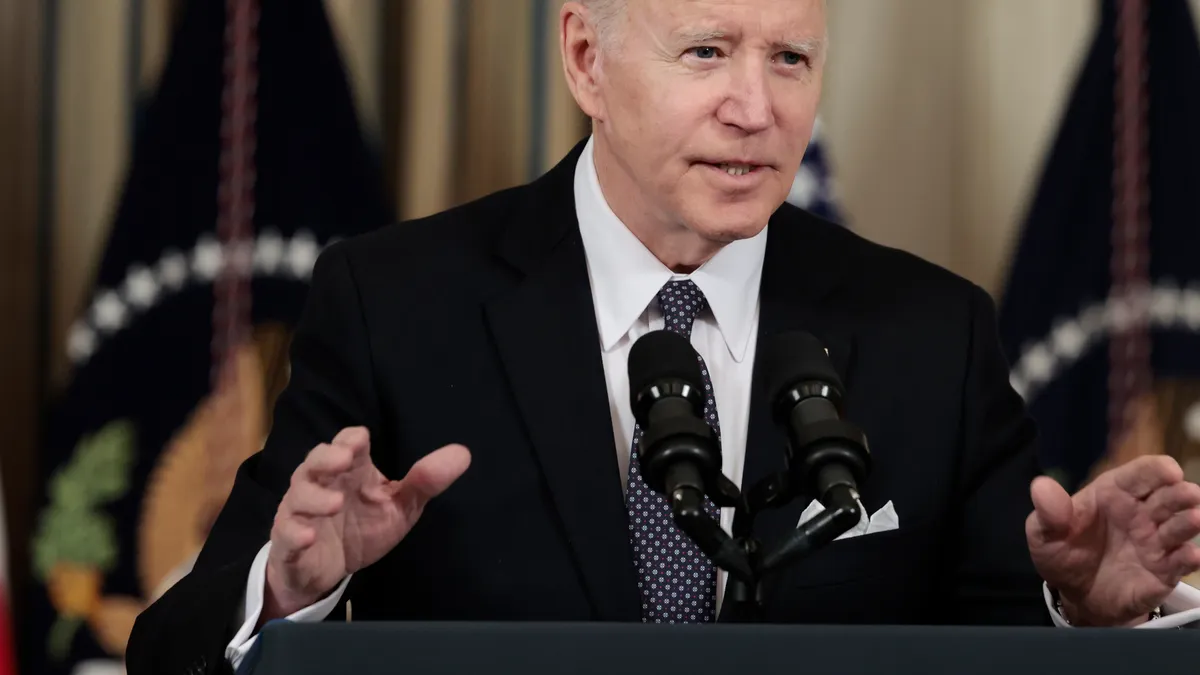Dive Brief:
-
President Joe Biden on Monday proposed a $5.8 trillion budget for fiscal year 2023 that includes $44.9 billion for clean energy, electrification and other programs to help cut greenhouse gas emissions and prepare the U.S. for the effects of climate change.
-
Biden's budget request includes a placeholder for clean energy tax credits and other energy provisions in the Build Back Better legislation, which are still being negotiated.
-
Biden proposed increasing the Department of Energy's budget 7.1% to $48.2 billion, up from $45 billion enacted in fiscal year 2022, partly to reflect spending required by the bipartisan infrastructure bill. The proposal includes $200 million for a new Solar Manufacturing Accelerator program to help spur domestic solar equipment production.
Dive Insight:
In a press briefing Monday, Biden said his budget request would reduce the federal deficit, help fight crime and boost spending on national security while providing energy-related benefits.
"My budget lowers family energy costs with tax credits to help people make their homes more efficient, research and development to broaden the reach of solar and build a clean energy future," Biden said.
The proposal sets the table for the House of Representatives and Senate to draft the next federal spending plan in the months leading up to a mid-term election.
The proposed budget lacks measures found in the Build Back Better bill, which included about $550 billion in energy-related provisions, such as tax credits, supply chain incentives and electric vehicle spending. The bill passed the House in November but stalled in the Senate, where it was opposed by Sen. Joe Manchin, D-W.Va.
The Biden administration "didn't want to get ahead of Congressional negotiations" by including those measures in the proposed budget, Office of Management and Budget Director Shalanda Young said Monday during a press briefing.
The proposed budget includes a "deficit-neutral reserve fund," effectively a placeholder, to give Congressional negotiators the room to develop legislation that reduces costs for Americans and reduces the deficit, Young said.
In a move that could affect investor-owned utilities, Biden proposed increasing the federal corporate tax rate to 28% from 21%. Biden proposed the same increase in the last budget cycle, but it wasn't included in the omnibus spending bill for FY22 that he signed March 15.
Biden's budget request includes $9.2 billion for clean energy research, development and deployment, up a third from FY 2021 enacted levels, at DOE as well as $90 million for a new Grid Deployment Office.
The proposed budget calls for increasing the budget for Advanced Research Projects Agency-Energy, called ARPA-E, to $700 million from $450 million. The agency, housed in DOE, helps develop emerging energy technologies that are too early for private sector investment.
At the Department of Interior, Biden's budget request calls for spending $254 million to speed up and expand clean energy deployment on public lands and offshore waters. The funding would support the leasing, planning and permitting of solar, wind and geothermal energy projects, and related transmission infrastructure, according to the summary of the proposed budget.
The proposed budget calls for spending $502 million to weatherize and retrofit low-income homes, including $100 million for a pilot program to electrify low-income homes. It also includes $150 million to electrify tribal homes and transition tribal colleges and universities to renewable energy.
The budget request includes $757 million for zero-emission vehicles and charging or fueling infrastructure for federal agencies to provide "immediate, clear, and stable" demand for clean vehicles and components, according to the budget request summary.













